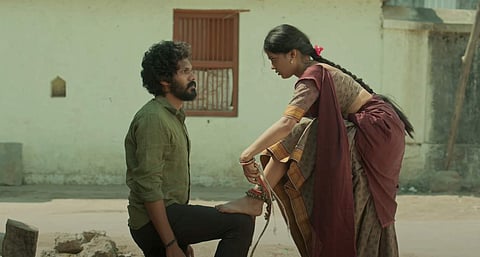Ardha Shathabdham Movie Review: Amateur making casts a shadow over this well-intentioned misfire
Rating:(1.5 / 5)
Opening scenes can often be deceiving. They can delude us into believing we are in for a great film only to leave us betrayed at the end of it all. Set in 2003, Rawindra Pulle’s Ardha Shathabdam, opens with a caste-fueled conflict. One of the villagers of Sircilla is persecuted by the members of the village panchayat for opening a barbershop, an occupation that must be ‘rightfully’ practiced only by people of a particular caste. The scene segues to an opening montage number illustrating the lifestyle of the village dwellers, and the sequence is specifically designed to emphasise the different occupations people adapt for a living. We see farmers, weavers, lumberjacks, sculptors, tailors, barbers, butchers, metalsmiths, pot-makers, and more.
Director: Rawindra Pulle
Cast: Karthik Rathnam, Navin Chandra, Sai Kumar, Krishna Priya, Subhaleka Sudhakar, Amani
Streaming on: Aha
What could be a better way to start a film about caste conflict than representing the various occupations, which, for generations, have been interlaced with caste? As we see some of them looking straight at the lens sporting broad smiles, Ardha Shathabdam, for a few moments, becomes a documentary, and is elicits a lovely response. But... this feeling soon fades away.
The authenticity of the opening stretch wears down as cinematic cliches start eroding the screenplay just minutes later. The writers palaver for over 45 minutes on the feeble and the often exasperating love story between Krishna (Karthik Rathnam, trying his best to salvage an underdeveloped script) and Pushpa (Krishna Priya, who simply exists in the frame). The film breaks into musical montages or songs every time the two come face-to-face, making Uppena look like a masterclass in song placement. Although the screenplay reels us back in time to their school days to set up their love story, we barely care for them. Even an emotional callback to this school during the final moments of the film hardly left an impression. Perhaps, the filmmaker felt the need to properly develop the love angle because it doubles up as the ‘incitement factor’ later in the screenplay. However, by the time this plot point arrives, I was restless.
Pushpa is the daughter of Ramanna (Sai Kumar in a character he can pull off in slumber), a former Naxalite who has forged his identity by standing up against caste inequality. However, he wastes no time in standing up for the inequality when he hears an inane dialogue from his nemesis. The crude line goes, “mana pakkana unna vaadu mana kulam kaakapoina parledhu, kaani mana bidda pakkalo undetodu mana vaadu ayyundali (It’s fine if the man beside us belongs to a different caste but it’s unacceptable for a guy from that caste to share the bed with our daughters).” Deterrents like the wavering politics of a character or how emotional frailties indoctrinate a person are fascinating issues to argue about, and I would have loved it for the film to give us nuanced arguments to ponder on. However, the incoherent narrative puts you off on a fundamental level, and how!
The entire second half of the film is centered on caste-related riots enkindled by Krishna’s foolish act and an equally trifling screenplay. Blood-thirsty people prowl across streets, massacring anyone and everyone. Even then we barely feel the lurking threat, and at certain points, the badly choreographed and terribly enacted scenes besmirch the scant emotional resonance that the writing tries to accomplish.
The villagers are slashed and killed, but they remain faceless extras, never to make a humanistic impression. The deaths and heinous hate crimes too leave us indifferent to the pain and sadness as we hardly know the people being butchered; the film’s devoid of the sense of belonging and kinship. When the filmmaker can spend 40 minutes on a juvenile love story, why not spend a couple of extra minutes to instill a sense of affinity towards these villagers? At one point, a low-caste man is hacked to death after having his genitals cleaved for stealing mangoes from the garden belonging to a higher caste person. We later see the perpetrators make sly remarks about his widow, who is now a cobbler. A scene as such should ideally leave our blood boiling, but it’s the tragic violin score that nudged me to feel sorry for the helpless woman. That’s the issue... the film fails to organically provoke you with its story-telling.
We also have a police officer (Ajay) in a conversation with a skewed politician (Subhalekha Sudhakar). Interestingly, they double up for right and wrong. The politician spouts allegories and analogies while the policeman is practical. Their discourse reflects the film’s idea—the disparity between the theoretical and pragmatic reading of the caste system and its consequences. The exchange—the clash of ideologies—is well-intentioned but inefficacious, and at times, frustrating, just like the film.

